Compass Project: Leading children towards a violence-free future


Sarah, a counselor at a day camp, faces a delicate situation: one of the children under her care confides in her about experiencing sexual violence. Sarah feels powerless and unsure of how to respond or where to turn for help. It is to address this need that the Compass project, an initiative by Marie-Vincent inspired by the Lanterne program, was created.
This innovative project aims to prevent sexual violence through sexuality education and the promotion of healthy, equitable relationships among children aged 6 to 12. By adapting and enhancing existing teachings, the Compass project provides concrete tools for professionals working directly with young people and their families. Over 200 organizations and 600 practitioners across Quebec will benefit from interactive training sessions and an educational toolkit designed to proactively support children.
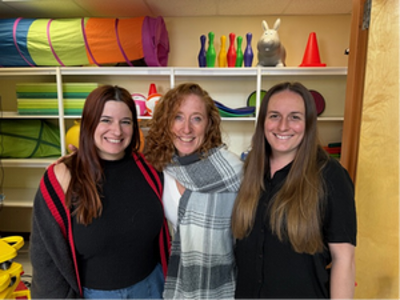
(From left to right) Jessica Martin, Mélanie Murphy, Mélissa Laliberté
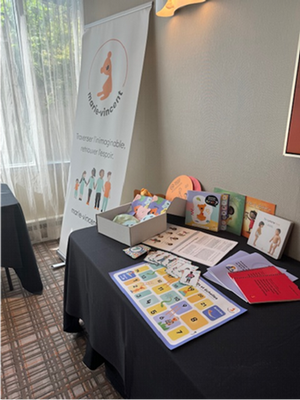
The Knowledge Exchange with The Knowledge Hub in Montréal, June 2024
An Approach Rooted in Reality
Step 1: Listen and Understand
The project began with an in-depth analysis of the needs of practitioners, parents, and children. Through interviews and focus groups involving over 50 professionals and 21 community organizations across five regions of Québec, the team identified some common challenges.
- The lack of resources tailored to the realities of various settings.
- Practitioners’ and parents’ hesitations to address sensitive topics.
- The need to strengthen professional skills while reassuring families.
These insights laid the foundation for the project and guided the creation of concrete solutions.
Knowledge dissemination
Following this needs analysis, key facts and recommendations emerged. This information has been compiled into an infographic, which has been distributed widely:
- External partners on the Boussole multidisciplinary committee.
- Participants in the Knowledge Hub’s discussion groups and community of practice.
- To a wider audience via the Marie-Vincent newsletter and the Lanterne community of practice.
To deepen and disseminate these lessons, a webinar organised in collaboration with the Learning Network and Knowledge Hub will be held on February 25, 2025. This webinar will offer a unique opportunity to discover the recommendations arising from this analysis, and to discuss priority issues in sexual violence prevention. Interested professionals can still consult the associated resources on the Marie-Vincent website and register for similar events in the future.
Step 2: Build and test
Based on the needs identified, Compass project has developed practical and accessible tools, including a flexible and engaging teaching kit.The kit is available in French, with an English translation to follow in 2025, and will be available on the website shortly.
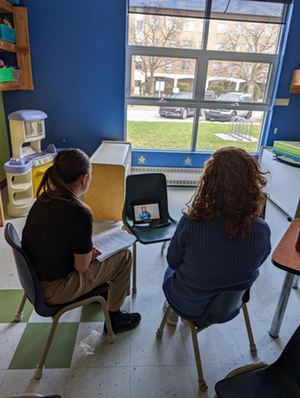
Training modules, both online and in-person, have also been developed to help professionals better integrate these tools into their daily practice. A free, 9-hour synchronous training session is offered. Additionally, online training modules specifically designed for day camp counselors address the particular needs of this audience, allowing them to adopt the toolkit even if they lack prior intervention experience. These resources were tested in various contexts, enabling the team to refine their relevance and effectiveness before broader dissemination.
The pilot implementation of the Compass program took place from mid-May to the end of June 2024, involving 16 participating organizations (community pediatric social centers, camps, family houses, community and recreational centers, and shelters for women and children experiencing domestic violence). Feedback following the training sessions was overwhelmingly positive:
- “Very well organized, clear, and the trainers were highly interactive. This training should be mandatory (very good resources). It could even be integrated into the DAFA (Diploma of Aptitude for Facilitation Functions).”
- “Highly relevant! A heavy topic, but addressed positively through prevention and education. The activities really make you think.”
- “The concrete examples, role-playing scenarios, and materials: all these elements seemed useful and well-structured. Very satisfied with the tools; we want more.”
Regarding the online training for counselors, the feedback was equally insightful:
- “Primarily, I’ll pay closer attention to what children say. Also, I will normalize behaviors related to sexuality while informing children that some behaviors are not appropriate at camp. Before, I didn’t really think about normalizing behaviors and mostly focused on warning the child…”
- “It was very useful in helping me truly understand the legal aspects of children’s sexuality, which I didn’t know before. It also helped me concretely improve how I intervene more effectively with children and parents on this subject.”
- “I’m glad I took it, and I think more counselors should take it to gain more tools. This is my second summer as a counselor, and I only heard about this training a week or two ago. I wish I had taken it earlier and been more aware of certain things beforehand.”
A Concrete and Lasting Impact
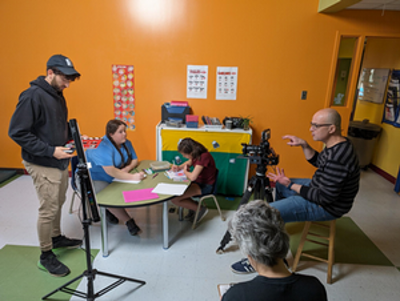
The Compass project goes beyond merely providing resources. It represents a collective movement aimed at transforming educational practices and building a safer future for children.
Through this project:
- Educators like Sarah now have the tools they need to engage in essential conversations with children.
- Parents find a space to overcome their apprehensions and better support their children.
- Community organizations strengthen their practices by actively participating in a preventive and inclusive approach.
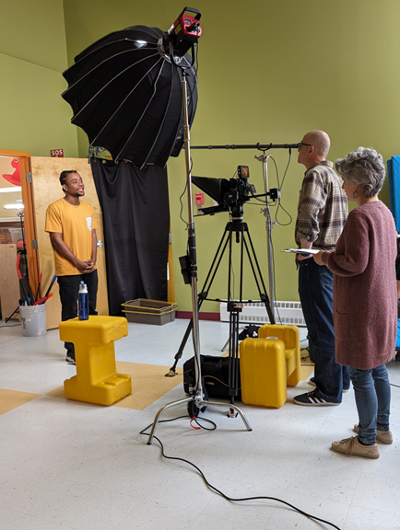
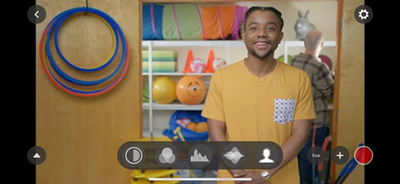
A Vision for the Future
The Compass Project aims to become a sustainable and widely shared model for prevention. With plans for implementation across Quebec and ongoing collaboration with the Marie-Vincent Research Chair, the project seeks to evaluate its impact and identify best practices. The evaluation will take place beginning in January 2025 and extending through fall 2025. This evaluation aims to:
-Assess the effects of the training on participants' knowledge, beliefs, and sense of self-efficacy related to preventing sexual violence through sexuality education and the promotion of equitable relationships.
-Measure participants’ satisfaction with the training.
-Explore the strengths and areas for improvement in the training, as well as participants’ recommendations.
-Document participants’ sense of self-efficacy in using the various educational tools provided.
Every child deserves to grow up in a safe and respectful environment. Thanks to the Compass Project , professionals and families now have the resources to make this a reality.
To learn more about this ambitious initiative and access the tools, visit the official website: marie-vincent.org.

Click here to view The Learning Network and Knowledge Hub Webinar, presented by Jessica Martin, recorded on February 25, 2025.
Community of Practice members:
Jessica Martin

Mélanie Murphy
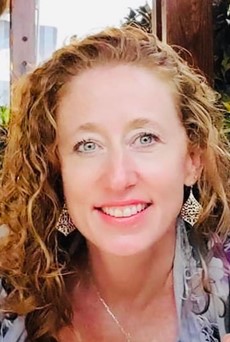
Myriam Le Blanc Élie

